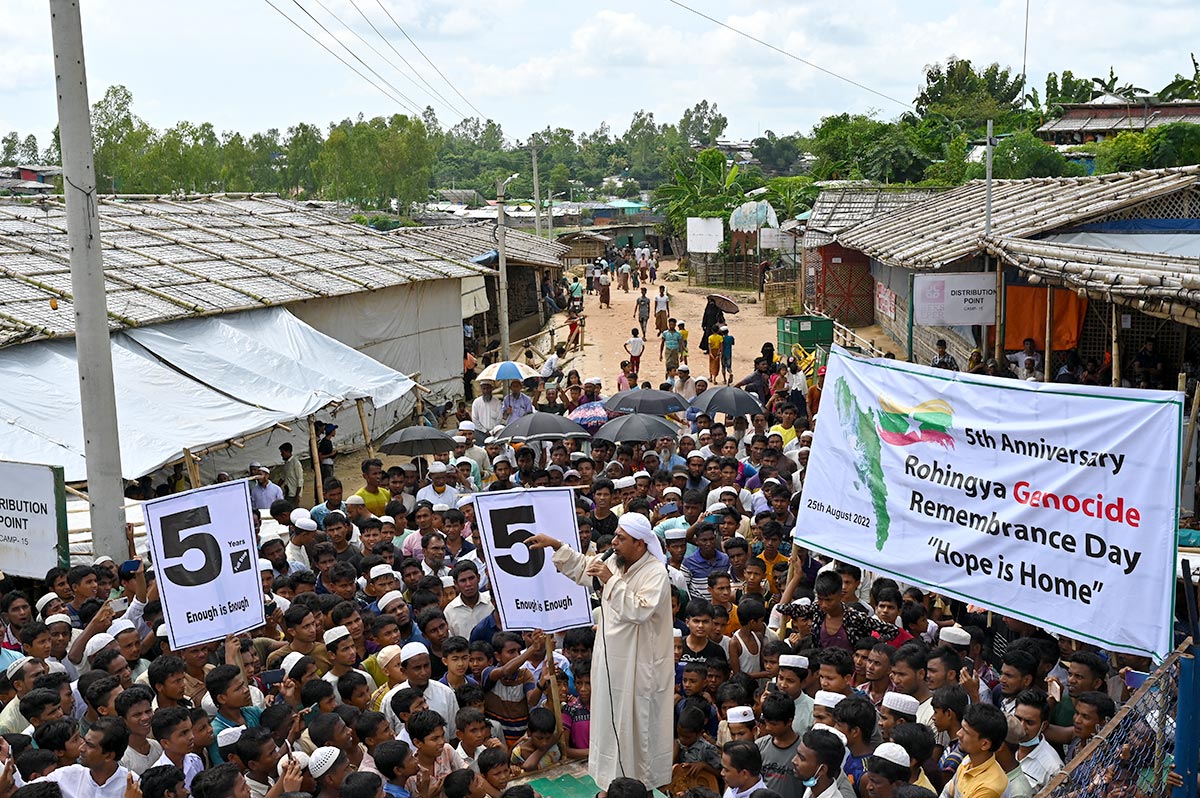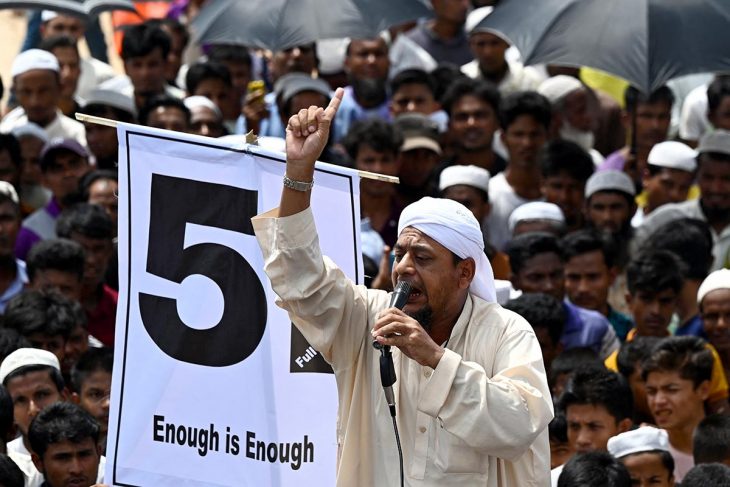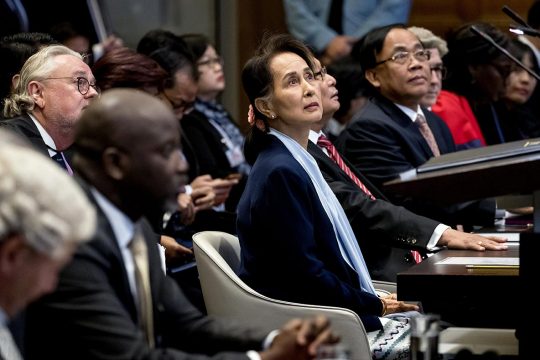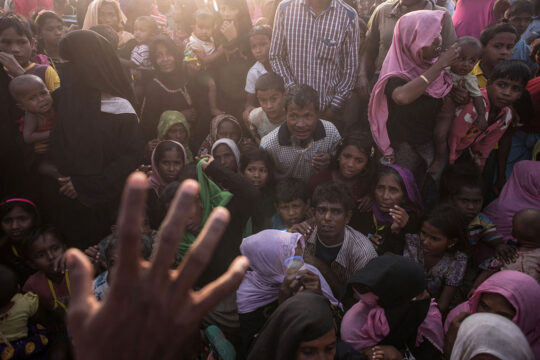JUSTICE INFO: Your latest annual report, released on August 9, documents widespread crimes that could amount to crimes against humanity. Would you say that these have been escalating since the military coup last year?
NICHOLAS KOUMJIAN: Yes. I would say that tragically, it appears to be getting worse and worse. We’re seeing more attacks in different areas where civilians are suffering, people being forced from their homes, reports of their detentions without due process and torture. And of course, the recent news about executions in what appear to be trials without due process.
In the past, a lot of the focus has been on the Rohingya. Are there many other people in other ethnic areas, for example, that are being subject to similar abuses?
Yes. And not only the ethnic areas, but also the Bamar heartland [which represents two thirds of the population of Myanmar, editor's note]. We've seen many other groups around the country experiencing similar problems in some ways to what happened to the Rohingya. We’re talking about burning villages, for example, or execution of civilians, retaliation against the civilian populations for attacks by opposition forces.
“Millions of pages of evidence”
Last time we spoke, the Mechanism wasn't yet fully operational. Can you tell us about the progress that you've made?
We've already gathered vast quantities of evidence. I don't want to give you an exact number, but I would say we've already gathered many millions of pages of evidence. A lot of it is from social media, for example photographs, posts, text or video. The challenge now is that we continue to gather evidence, because the crimes are still happening.
Evidence from social media can be used to back up a case, or a case file, but it's not usually enough. So presumably you also need to corroborate it with witness testimonies and other evidence…
We're gathering witness testimonies, and that's at the heart of our activities, speaking to those who either suffered from the events or have information about what happened, who was responsible. Those are key witnesses. And we're in the process of gathering that testimony, but we still have a long way to go, many people to speak to.
Investigating without access to the country
I understand from your report that you have put in requests to the Myanmar de-facto authorities but have not received any response or been able to visit the country. Is that correct?
That’s correct. We continue to put in requests, but have not received any response.
So, if you can't go to Myanmar and the authorities are not giving you information, can you explain a bit more how you manage to talk to witnesses?
Well, it's not the first time that international criminal investigations have been done without having access to the country. It certainly makes it much more difficult, but we speak to witnesses when and where we can. Many of those who suffered in Rakhine state, the Rohingya are in Bangladesh, and we expect to be taking more statements in Bangladesh this year. We're very grateful for the cooperation we've received from the Bangladeshi authorities.

You are sharing evidence with the International Criminal Court (ICC) and the International Court of Justice (ICJ), which have started procedures on Myanmar. Can you tell us how that works?
At the ICC, we're cooperating with the Office of the Prosecutor, and we're keeping them informed on our investigation. They have made some requests for information, which we shared with them. They also give us some idea of what they're doing, so we're not going to step on each other's toes, contacting the same individuals, for example. With the ICJ, we've said that we will provide information to the parties and we had requests for information from both The Gambia and Myanmar back in 2019. We have said we would review what we believe is relevant evidence to those proceedings and share it with both parties, provided we have the consent of those that gave us the information and that we were confident that disclosing information would not endanger anyone.
And the ICJ has recently decided that it does have jurisdiction in The Gambia’s case against Myanmar for alleged genocide against the Rohingya…
Yes, the court rejected Myanmar's preliminary objections to jurisdiction. That means that the case is now going forward. The legal arguments about jurisdiction have been resolved, and now they'll start going into the merits of the case. That still could take some years.
You say resources are a challenge and you have a mass of information. How do you prioritize?
Of course, you don't want to ignore any crime, but you have to prioritize. Obviously things like the scale of the crime and the level of an individual’s responsibility. We're more interested in the person that gave an order to burn down a village, for example, than the individual soldiers that set each house on fire. We're also prioritizing sexual violence and crimes against children. They're often not reported and they're hard to prosecute. And there are certain cases that are just more likely to result in prosecutions. For example, with crimes in detention, there's usually more evidence available about who is responsible than a situation like an indiscriminate attack on a civilian object. We don't ignore those, but they're more difficult. Who gave the order? What did they know about whether it was a school or a mosque, etc.? So often we look at cases where we think there's a greater chance of proving individual responsibility.
“The Rohingya and others share a common problem”
Do you see prospects for justice for the Rohingya any time soon?
Well, it's a very depressing situation and it's actually very complicated. But I am hopeful because there are several ongoing proceedings, this ICC investigation, the International Court of Justice case, which we think is very important because it deals with that issue of state responsibility, the duty to prevent and punish genocide. And you even have now one national investigation in Argentina on the issue of the Rohingya. But the other thing that makes me somewhat hopeful is that although it's terrible what's happened since the coup, we've seen this violence in areas where such crimes were not previously committed against civilians and I think there's a growing recognition from all the peoples of Myanmar that they've all suffered similarly. There is a sort of recognition that the Rohingya and others share a common problem, and that is the impunity of military leaders who have gotten away with committing crimes against civilians to perpetuate their rule.








